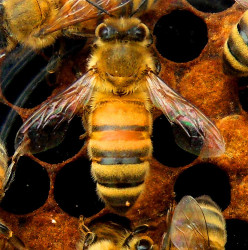BASF’s Fipronil Deemed a Risk to Bees

According to a new report by the European Food Safety Authority (EFSA), BASF’s seed treatment pesticide Fipronil poses a “high acute risk to honeybees when used as a seed treatment for maize.” This report comes after the temporary banning of the neonicotinoids clothianidin, imidacloprid and thiamethoxam in the EU.
EFSA’s findings identify three potential areas of risk. The first potential risk, dust drift, is said to include sunflower applications. Full risk assessments for dust drift could not be completed so the level of dangerous exposure to honeybees could not be established.
The second area of concern, nectar and pollen, has been established to pose a low risk to honeybees, but field and semi-field trials were deemed to be weak and thus insufficient to establish actual risk. The final EFSA area of concern lies in several identified gaps in available data for other potential routes of exposure such as guttation fluid.
According to a statement released by BASF, these findings do not uncover any new risk to bee health from approved uses of the insecticide. Jürgen Oldeweme, senior vice president global product safety and regulatory affairs for BASF’s Crop Protection division, said, “Bees play an important role in agriculture, as they are major pollinators for plants and crops. Our business is very dependent on bees; therefore, it is in our best interest to understand the real causes of the decline in bee health and act upon them. Nonetheless,” he continued, “The problem of declining bee health must be addressed via a holistic approach and not by singling out certain technologies that have a solid record of safe use, such as fipronil.”
Fipronil has been on the market since 1993 and is in use on 100 different crops in more than 70 countries. BASF stated they are open to discussing potential data collection endeavors with EFSA and the European Commission to directly address bee health.





